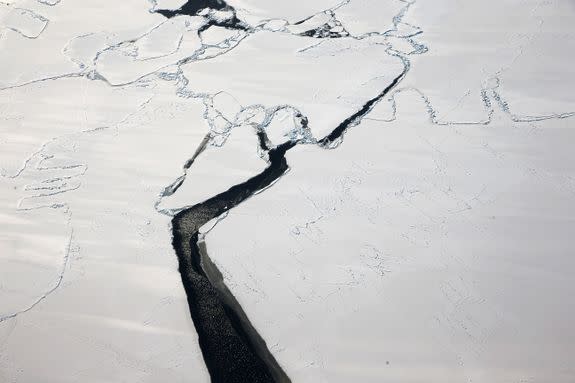Here's what the Ice Age tells us about future sea level rise

A new study on an ancient ice sheet may hold important clues about our planet's future.
The research focuses on the Laurentide Ice Sheet, the massive expanse covering North America during the last Ice Age, which ended about 10,000 years ago. A team of scientists found that small spikes in the temperature of the ocean — not the air — likely caused periods of rapid melting and splintering of the ice.
SEE ALSO: This 'GOT' star teamed up with Google to capture Greenland's melting ice
Their findings add to a growing body of evidence that climate change could ultimately drive sea levels even higher than today's models predict, according to the study published Feb. 15 in the journal Nature. Glaciers in Greenland, Antarctica and other areas have been melting rapidly in recent years due in part to increasing ocean temperatures.
"It is possible that modern-day glaciers ... are more sensitive to ocean warming than we previously thought," said Jeremy Bassis, the study's lead author and an associate professor of climate and space sciences at the University of Michigan.

Image: Mario Tama/Getty Images
For the study, Bassis and his colleagues looked at so-called Heinrich events: the periods during which the Laurentide Ice Sheet would rapidly disintegrate.
Roughly every 8,000 years, the ice sheet's edges would break off, sending a vast armada of icebergs flowing into the Atlantic Ocean. The icebergs carried sediment from around Canada's Hudson Bay and deposited the dirt on the ocean floor. They also boosted sea levels by more than 6 feet over the course of hundreds of years.
What triggered these Heinrich events has largely befuddled scientists.
The rapid melting periods occurred during the coldest times of the last Ice Age — exactly the opposite of what you'd expect during a major ice melt.

Image: university of michigan
To determine why the ice melted despite the cold air temperatures during these times, the University of Michigan team focused on the role the oceans played, studying ice core and ocean-floor sediment records to estimate how temperatures varied over thousands of years. They also used Bassis' mathematical model for describing how ice reacts to air and ocean temperatures, and the implications for sea level rise.
The scientists next created simulations of the timing and size of the massive Laurentide melting events. They found that even small changes in sub-surface ocean temperatures — of just 1 degrees Celsius, or 1.8 degrees Fahrenheit — could lead to sea level-boosting Heinrich events.
"Warm warm ocean water that's just tickling the edge of the ice sheets can trigger these catastrophic [ice] retreats that could last for centuries," Bassis said.
The Nature study supports earlier findings that warmer North Atlantic water temperatures may have set the Heinrich events in motion.

Image: university of michigan
A 2011 study led by Shaun Marcott of the University of Wisconsin proposed that, thousands of years ago, sub-surface warming likely destabilized the ice and caused ice shelves to collapse near the Hudson Strait, which links the Hudson Bay to the Atlantic Ocean.
The Nature study also lends further credence to the idea that Heinrich events reflect what's happening today on the rapidly melting Greenland and Antarctic ice sheets, said Richard Alley, a professor of geosciences at Penn State University, who was not involved in the new research.
Alley co-authored a 2015 paper that concluded that — based on the Ice Age's events — changes in ocean temperatures could drive future sea level rise even before the air grows significantly warmer in Antarctica.
Unlike in the past, when air and ocean temperature shifts were natural in origin today's oceans are warming largely due to human-driven climate change. More than half of the increase in global ocean heat content has occurred in the last two decades, according to the National Oceanic and Atmospheric Administration (NOAA).

Image: U.S. environmental protection agency
"This new paper is a nice demonstration supporting earlier hypotheses that ice sheets are highly sensitive to warming in the surrounding water, as well as to warming in the air," Alley said.
It also shows "that predicting the future of the ice sheets will mean understanding the changes in the ocean and the air," he added.
For Peter Clark, however, the fact that Wednesday's study only affirmed earlier conclusions meant the researchers didn't actually offer new evidence that future sea levels may be higher than we're predicting.
"Current models may be underestimating future sea level rise, but the results of this new paper don't give us any reason to think that this is the case," said Clark, an earth, ocean and atmospheric sciences professor at Oregon State University.
